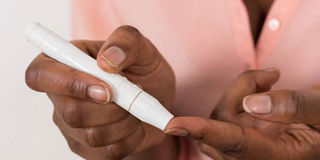Time for holistic approach to diabetes

A woman checks her blood sugar level with a glucometer. FILE PHOTO
What you need to know:
- Diabetes can lead to complications in many parts of the body and increase the overall risk of dying prematurely.
- Diabetes is also implicated in renal failure, leading to dependency on dialysis and kidney transplants.
- There is a need to sensitise people about the benefits of eating natural and freshly cooked foods.
It is time we got serious about tackling one of the biggest silent killers.
We need to take personal responsibility and our caregivers must get serious.
Diabetes remains one of the leading non-communicable diseases, accounting for 40 per cent of deaths in Kenya annually.
A 2016 report jointly published by the World Health Organisation (WHO) and the Lancet indicated that one in every 17 Kenyans has diabetes.
The data also shows that between 650,000 and 1.5 million Kenyans are suffering from undiagnosed diabetes.
POOR LIFESTYLES
The disease is largely attributed to poor lifestyles, including bad nutritional habits and lack of exercise.
Diabetes can lead to complications in many parts of the body and increase the overall risk of dying prematurely.
Diabetes is the primary cause of blindness in adults aged 20 to 74.
Although the causes of Type 1 diabetes remain largely unknown, a vast majority of patients globally have Type II, as a result of excess body weight and inactivity.
Diabetes is also implicated in renal failure, leading to dependency on dialysis and kidney transplants.
HOLISTIC MEDICAL CARE
Diabetes requires a multi-disciplinary approach to ensure patients get holistic medical care, education, aggressive prevention and management of complications.
The Ministry of Health continues to work with stakeholders to significantly reduce the cost of diabetes drugs and ensure that public health facilities are well-stocked.
Since 2015, the ministry through partnerships with county governments and various organisations has supported public health institutions in providing daily comprehensive diabetes clinics, through training, and the provision of medical equipment.
Due to the alarming increase in diabetes, the ministry has prioritised prevention and control.
TRADITIONAL FOODS
One of the ways of enhancing prevention is watching what we eat.
Many Kenyans are shying away from eating traditional foods, preferring packaged and highly processed food.
There is a need to sensitise people about the benefits of eating natural and freshly cooked foods.
The other major challenge is lack of special diabetes clinics, trained personnel, reliable data for planning and resources, and low awareness among policy makers on the need to make care a priority.
The launch at MP Shah Hospital, Nairobi, of a comprehensive diabetes care centre, is a vital step in tackling diabetes.
SPECIAL TEAM
For the first time in the region, a multi-specialty hospital will have a diabetes centre with a special team of endocrinologists, diabetic educators, dieticians, podiatrists, physicians, cardiologists, nephrologists, vascular surgeons, eye and dental specialists along with trained nurses on a full-time basis.
The MP Shah Diabetes Care Centre is not only a milestone in managing the disease, but a change in the way it has been traditionally treated.
MP Shah has developed a special model to tackle diabetes on a range of fronts, from prevention and expert education through to clinical treatment.
To promote awareness about prevention, the hospital and Lions Club International have incorporated twice a month health screenings to be rolled out across the country.
GO FOR SCREENING
A lot still remains to be done and the journey to changing how we tackle diabetes is long.
It is, therefore, important that all stakeholders, including the government, prioritise diabetes care services in all public and private hospitals.
This includes strengthening existing clinics and mobilising more Kenyans to go for screening.
If implemented correctly, it is possible for Kenya to achieve the 2030 agenda on sustainable development by WHO member states to reduce premature deaths from non-communicable disease, including diabetes, by one third.
Mr Das is the CEO of MP Shah Hospital, Nairobi. [email protected]




